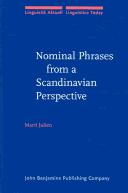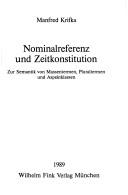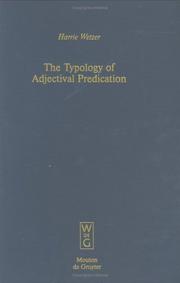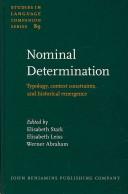| Listing 1 - 10 of 19 | << page >> |
Sort by
|
Book
ISBN: 1316823776 1316836231 9781316823774 1107178665 9781107178663 9781316630983 131683266X Year: 3032 Publisher: Cambridge Cambridge University Press
Abstract | Keywords | Export | Availability | Bookmark
 Loading...
Loading...Choose an application
- Reference Manager
- EndNote
- RefWorks (Direct export to RefWorks)
This book focuses on current theoretical and empirical research into countability in the nominal domain, and to a lesser extent in the verbal domain. The presented state-of-the-art studies are situated within compositional semantics combined with the theory of mereology, and draw on a wealth of data, some of which have hitherto been unknown, from a number of typologically distinct languages. Some contributions propose enrichments of classical extensional mereology with topological and temporal notions as well as with type theory and probabilistic models. The book also presents analyses that rely on cutting-edge empirical research (experimental, corpus-based) into meaning in language. It is suitable as a point of departure for original research or material for seminars in semantics, philosophy of language, psycholinguistics and other fields of cognitive science. It is of interest not only to a semanticist, but also to anybody who wishes to gain insights into the contemporary research into countability.
Grammar, Comparative and general --- Nominals (Grammar) --- Noun-equivalents (Grammar) --- Substantives (Grammar) --- Nominals. --- Noun phrase --- Nominals --- Linguistics --- Philology

ISBN: 1282156411 9786612156410 9027294127 9789027294128 9789027233516 9027233519 9027233519 9781282156418 6612156414 Year: 2005 Publisher: Amsterdam Benjamins
Abstract | Keywords | Export | Availability | Bookmark
 Loading...
Loading...Choose an application
- Reference Manager
- EndNote
- RefWorks (Direct export to RefWorks)
This monograph presents a new model of the internal syntax of nominal phrases. The model is mainly based on Scandinavian, since with the wide range of variation that Scandinavian displays in the nominal domain, despite the close genetic relationship between the different varieties, Scandinavian is particularly well-suited for explorations into nominal syntax. Among the topics covered are the basic syntactic structure of nominal phrases, definiteness, adjective phrases, possessors, relative clauses, and nominal predicates. The model is however meant to be a tool for analysing the nominal phrase.
Scandinavian languages --- Grammar, Comparative and general --- Nominals (Grammar) --- Noun-equivalents (Grammar) --- Substantives (Grammar) --- Nordic languages --- Norse languages --- North Germanic languages --- Germanic languages --- Nominals. --- Noun phrase --- Nominals --- Linguistics --- Philology

ISBN: 3770526139 Year: 1989 Publisher: München Fink
Abstract | Keywords | Export | Availability | Bookmark
 Loading...
Loading...Choose an application
- Reference Manager
- EndNote
- RefWorks (Direct export to RefWorks)
Lexicology. Semantics --- 801.56 --- Syntaxis. Semantiek --- 801.56 Syntaxis. Semantiek --- Grammar, Comparative and general --- Reference (Linguistics) --- Signification (Linguistics) --- Linguistics --- Onomasiology --- Semantics --- Nominals (Grammar) --- Noun-equivalents (Grammar) --- Substantives (Grammar) --- Nominals --- Noun phrase --- Philology
Book
ISBN: 9789027206947 9027206945 9027267022 9789027267023 Year: 2016 Volume: 113 Publisher: Amsterdam Benjamins
Abstract | Keywords | Export | Availability | Bookmark
 Loading...
Loading...Choose an application
- Reference Manager
- EndNote
- RefWorks (Direct export to RefWorks)
Grammar, Comparative and general --- Finiteness (Linguistics) --- Morphosyntactic features --- Morphosyntax --- Finite (Linguistics) --- Nominals (Grammar) --- Noun-equivalents (Grammar) --- Substantives (Grammar) --- Nominals. --- Morphosyntax. --- Morphology --- Syntax --- Noun phrase --- 801.56 --- 801.56 Syntaxis. Semantiek --- Syntaxis. Semantiek --- Finiteness (Linguistics). --- Functionalism (Linguistics). --- Parenthetical constructions. --- Functionalism (Linguistics)
Book
ISBN: 9027270708 9789027270702 1306409934 9781306409933 9789027255938 9027255938 Year: 2014 Publisher: Amsterdam Philadelphia John Benjamins Publishing Company
Abstract | Keywords | Export | Availability | Bookmark
 Loading...
Loading...Choose an application
- Reference Manager
- EndNote
- RefWorks (Direct export to RefWorks)
Patterns of nominalization in Blackfoot are surveyed. It is demonstrated that two of these patterns behave like nouns while two others only partially behave like nouns. Degrees of nominality are analyzed within the assumption that there is a universal syntactic spine, a hierarchically organized set of categories, which are not intrinsically specified for nominality or verbality. They are category-neutral. Different nominalization patterns (and degrees of nominality) reduce to different ways of introducing the nominalizer: it may be introduced by a dedicated morphological marker (nominalization
Grammar, Comparative and general --- Nominals (Grammar) --- Noun-equivalents (Grammar) --- Substantives (Grammar) --- Nominals. --- Noun phrase --- Linguistics --- Language and languages --- Foreign languages --- Languages --- Anthropology --- Communication --- Ethnology --- Information theory --- Meaning (Psychology) --- Philology --- Linguistic science --- Science of language --- Nominals --- Linguistics. --- Language and languages.
Book
ISBN: 9789027202444 9789027262738 902726273X 9027202443 Year: 2019 Publisher: Amsterdam John Benjamins Publishing Company
Abstract | Keywords | Export | Availability | Bookmark
 Loading...
Loading...Choose an application
- Reference Manager
- EndNote
- RefWorks (Direct export to RefWorks)
Recent scholarship has confirmed earlier observations that nominalization plays a crucial role in the formation of complex constructions in the world’s languages. Grammatical nominalizations are one of the most salient and widespread features of languages of the Americas, yet they have not been approached as foundational grammatical structures for constructions such as relative clauses and complement clauses. This is due to an imbalance in past scholarship, which has tended to focus on these constructions at the expense of the nominalization structures underlying them. The papers in this collection treat grammatical nominalizations in their own right, and as a starting point for the investigation of their uses in complex grammatical structures. A representative sample of Amerindian languages, with focus on South America, examines properties of grammatical nominalizations such as their multiple functions, their internal and external syntax, and their diachronic development. Among the far-reaching theoretical conclusions reached by the studies in this volume is that the various types of relative clauses recognized in the typological literature are actually no more than epiphenomena arising from the different uses of grammatical nominalizations.
Lexicology. Semantics --- Grammar --- South American Indian languages --- E-books --- Grammar, Comparative and general --- Language and languages --- Syntax --- Noun --- Nominals (Grammar) --- Noun-equivalents (Grammar) --- Substantives (Grammar) --- Nominals. --- Noun. --- Syntax. --- Nominals --- Noun phrase --- Linguistics --- Philology --- Grammar, Comparative and general Syntax --- America --- Languages.

ISBN: 3110149893 130627544X 3110813580 9783110813586 9783110149890 Year: 1996 Volume: 17 Publisher: Berlin Mouton de Gruyter
Abstract | Keywords | Export | Availability | Bookmark
 Loading...
Loading...Choose an application
- Reference Manager
- EndNote
- RefWorks (Direct export to RefWorks)
Grammar --- Grammar, Comparative and general --- Typology (Linguistics) --- Adjectif --- Nominaux --- Verbaux --- Typologie (Linguistique) --- Adjective --- Nominals --- Verbals --- Adjectivals. --- Nominals. --- Verbals. --- Nominals (Grammar) --- Noun-equivalents (Grammar) --- Substantives (Grammar) --- Adjectivals --- Language and languages --- Linguistic typology --- Verbals (Grammar) --- Verbids (Grammar) --- Adjectival constructions --- Adjective groups --- Typology --- Linguistics --- Linguistic universals --- Noun phrase --- Classification --- Verb phrase --- Philology --- TYPOLOGIE (LINGUISTIQUE) --- GRAMMAR, COMPARATIVE AND GENERAL --- ADJECTIVALS --- NOMINALS --- VERBALS

ISBN: 9789027230997 9027230994 9786612152757 1282152750 9027292108 9789027292100 9781282152755 6612152753 Year: 2007 Volume: 89 Publisher: Amsterdam Benjamins
Abstract | Keywords | Export | Availability | Bookmark
 Loading...
Loading...Choose an application
- Reference Manager
- EndNote
- RefWorks (Direct export to RefWorks)
The following theoretical-empirical points on the DP are discussed: Article and its referential-anaphoric properties by Abraham (Determiners in Centering Theory); Bartra (On bare NPs in Old Spanish and Catalan); identification of all functional nominal categories by Stvan (Bare singular count nouns); Kupisch & Koops (Specificity and negation); Jäger (History of German indefinite determiners); typological comparison of the interaction of nominal and verbal determination by Abraham (Discourse-functional crystallization of the original demonstrative); Leiss (Covert (in)definiteness and aspect in Old Icelandic, Gothic, Old High German); Lohndal (Double definiteness during Old Norse); emergence of DP in ontogeny/phylogeny by Osawa (DP, TP and aspect in Old English and L1 acquisition); Bittner (Early functions of definites in L1 acquisition); Wood (Demonstratives and possessives emergent from Old English); Bauer ((in)definite articles in Indo-European) and Stark (Variation in nominal indefiniteness in Romance).
Grammar --- Grammar, Comparative and general --- Definiteness (Linguistics) --- Nominals (Grammar) --- Noun-equivalents (Grammar) --- Substantives (Grammar) --- Indefiniteness (Linguistics) --- Linguistics --- Determinatives (Linguistics) --- Determiners (Linguistics) --- Classifiers (Linguistics) --- Determiners. --- Nominals. --- Noun phrase --- Determiners --- Déterminants (Linguistique) --- Définis (Linguistique) --- Nominaux --- Definiteness (Linguistics). --- Languages & Literatures --- Philology & Linguistics --- Nominals --- Philology
Book
ISBN: 9781501514586 9781501505430 9781501505416 150151458X 1501505432 1501505416 Year: 2017 Publisher: Berlin de Gruyter Mouton
Abstract | Keywords | Export | Availability | Bookmark
 Loading...
Loading...Choose an application
- Reference Manager
- EndNote
- RefWorks (Direct export to RefWorks)
This book contributes to the recent theoretical developments in the area of mutual interactions of valency and aspect, as expressed in different types of verb-related nominal structures (nominalizations and synthetic compounds). A wide range of data from Slavic, Hellenic, Germanic, Romance and Semitic languages provides an empirical testing ground for competing theoretical explanations couched in the lexicalist and construction-based frameworks.
Comparative linguistics --- Grammar --- Grammar, Comparative and general --- Noun phrase. --- Nominals. --- Syntax. --- Language and languages --- Syntax --- Noun phrase --- Subject (Grammar) --- Nominals (Grammar) --- Noun-equivalents (Grammar) --- Substantives (Grammar) --- Complex nominals --- Subject --- Nominals --- Linguistics --- Philology --- Grammar, Comparative and general Syntax --- Aspect. --- Nominalization. --- Synthetic Compounding. --- Valency.
Book
ISBN: 0262314509 9780262314503 1306290635 9781306290630 9780262019729 0262019728 9780262525022 026252502X Year: 2013 Publisher: Cambridge, Massachusetts
Abstract | Keywords | Export | Availability | Bookmark
 Loading...
Loading...Choose an application
- Reference Manager
- EndNote
- RefWorks (Direct export to RefWorks)
In this work, David Pesetsky argues that the peculiarities of Russian nominal phrases provide significant clues concerning the syntactic side of morphological case. Pesetsky argues against the traditional view that case categories such as nominative or genitive have a special status in the grammar of human languages.
Grammar, Comparative and general -- Nominals. --- Russian language -- Case. --- Russian language -- Morphology. --- Russian language -- Syntax. --- Russian language --- Grammar, Comparative and general --- Case. --- Morphology. --- Syntax. --- Nominals. --- LINGUISTICS & LANGUAGE/General --- Nominals (Grammar) --- Noun-equivalents (Grammar) --- Substantives (Grammar) --- Noun phrase --- Nominals --- Case --- Morphology --- Syntax --- Languages & Literatures --- Slavic, Baltic and Albanian Languages & Literatures --- Linguistics --- Philology
| Listing 1 - 10 of 19 | << page >> |
Sort by
|

 Search
Search Feedback
Feedback About UniCat
About UniCat  Help
Help News
News